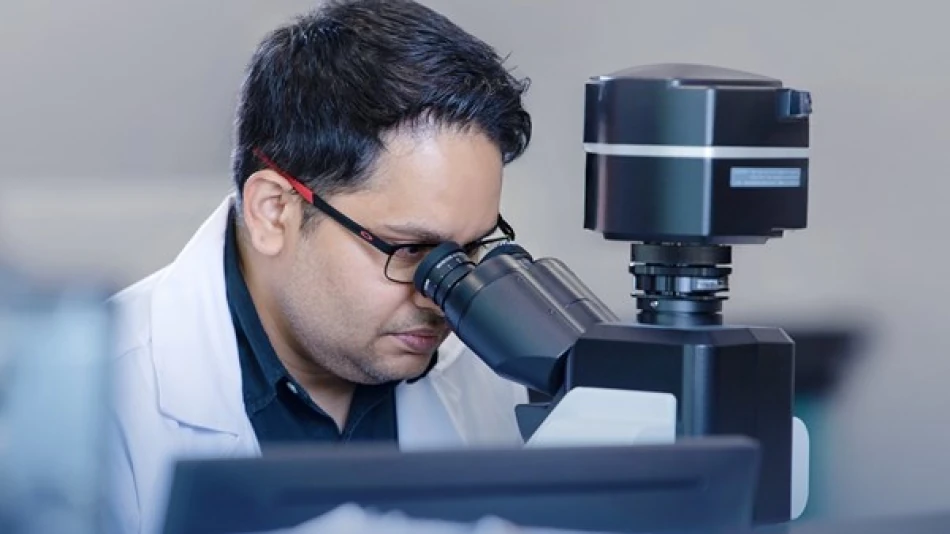
Pioneering Genomic Breakthrough: Dubai Health Researchers Unveil Comprehensive Arab Genome Reference
UAE Scientists Create First Comprehensive Arab Genomic Reference, Filling Critical Gap in Global Medical Research
Researchers at Mohammed Bin Rashid University of Medicine and Health Sciences have published the first comprehensive Arab genomic reference in Nature Communications, revealing over 235,000 genetic variants unique to Arab populations that were previously undocumented in global databases. This groundbreaking study addresses a critical underrepresentation in genomic research and provides the scientific foundation for precision medicine tailored to Arab populations across the Middle East.
Addressing a Global Genomic Bias
Despite rapid advances in genomic research over the past two decades, most foundational genetic data remains derived from a limited segment of the world's populations, creating significant gaps in understanding genetic risks and treatment responses across diverse communities. This Arab genomic reference directly tackles this disparity by analyzing DNA sequences from 53 individuals of diverse Arab backgrounds in the UAE.
The research uncovered more than 110 million DNA base pairs, 9 million genetic variants, and crucially, over 235,000 structural variants specific to Arab populations that had never been documented in established global databases. Among the most significant discoveries was a duplicated gene (TAF11L5) found in all Arab participants but absent from existing global genomic references, potentially playing a crucial role in regulating other genes.
Strategic Alignment with National Health Goals
The timing of this research aligns perfectly with the UAE's National Genome Strategy, launched by the Emirates Genome Council in 2023 as a decade-long initiative to develop preventive and precision healthcare services. This strategy aims to deliver personalized treatment for each patient through genomic sciences and modern technologies.
Dr. Alawi Alsheikh-Ali, Director General of Dubai Health Authority and co-researcher on the study, emphasized the research's role in positioning the UAE as a leader in genomic science while ensuring future medical innovations align with the genetic characteristics of Arab communities.
Technical Innovation and Global Accessibility
Beyond the genomic discoveries, the research team developed "PanScan," a bioinformatics tool specifically designed to support complex analyses of comprehensive human genomes. This tool enables researchers to identify gene duplications, DNA variants, and complex genetic structures, and has been made freely available on GitHub for global research use.
Dr. Nasna Nassir, Assistant Professor and lead researcher, highlighted how PanScan was instrumental in detecting unique genetic analyses within their study and is now supporting similar research worldwide.
Market and Healthcare Implications
This genomic reference represents more than academic achievement—it has immediate practical implications for healthcare delivery and pharmaceutical development in the region. By identifying biomarkers and supporting treatment programs designed according to population-specific genetic makeup, the research enables more effective drug development and clinical trials tailored to Arab populations.
For healthcare systems across the Middle East, this data could significantly improve diagnostic accuracy and treatment efficacy, potentially reducing healthcare costs while improving patient outcomes. Pharmaceutical companies developing treatments for regional markets now have access to crucial genetic data that was previously unavailable.
Regional Leadership in Precision Medicine
The UAE's investment in genomic research positions it alongside other nations pursuing comprehensive genomic initiatives, but with a unique focus on addressing underrepresented populations. Unlike broader genomic projects in the US or Europe, this research specifically targets the genetic diversity gap affecting Arab populations globally.
Dr. Mohammed Uddin, Director of the Center for Applied and Translational Genomics and supervising researcher, described the reference as a qualitative leap in understanding genetic diversity among Arab peoples, serving as a crucial scientific resource for both research discoveries and clinical genetic diagnostics.
The comprehensive nature of this research, conducted entirely within Dubai Health's advanced laboratory facilities, demonstrates the emirate's commitment to building world-class infrastructure supporting national scientific capabilities. This approach ensures quality control and efficient time management while establishing Dubai as a regional hub for genomic research and precision medicine development.
Most Viewed News

 Layla Al Mansoori
Layla Al Mansoori






